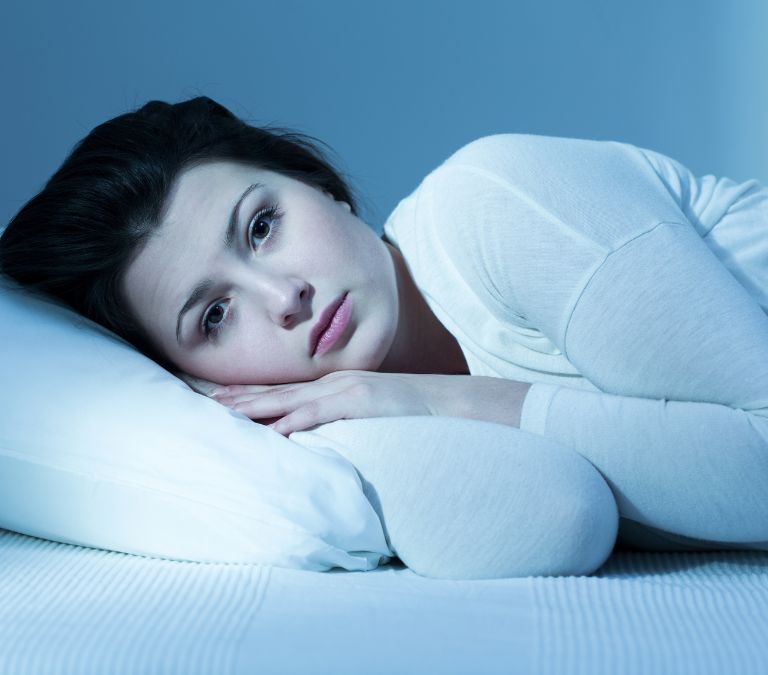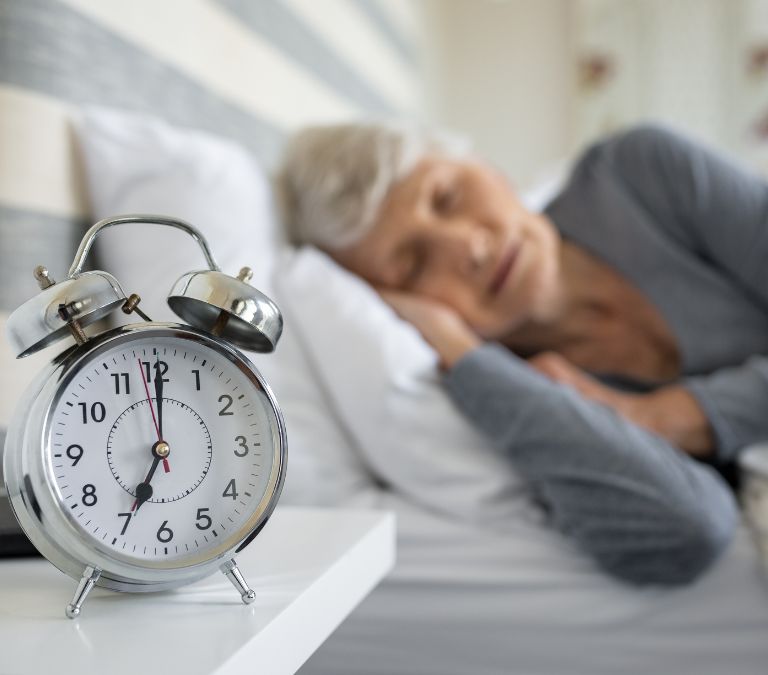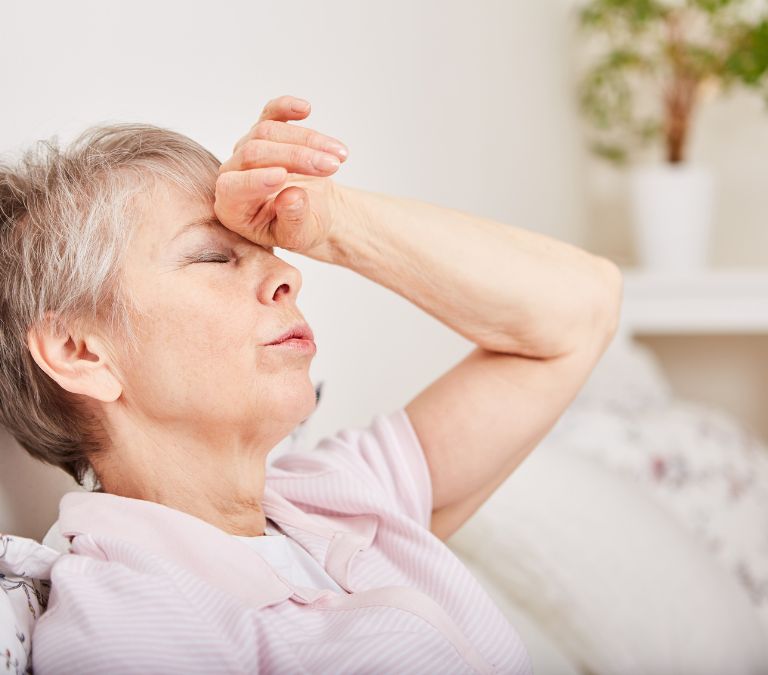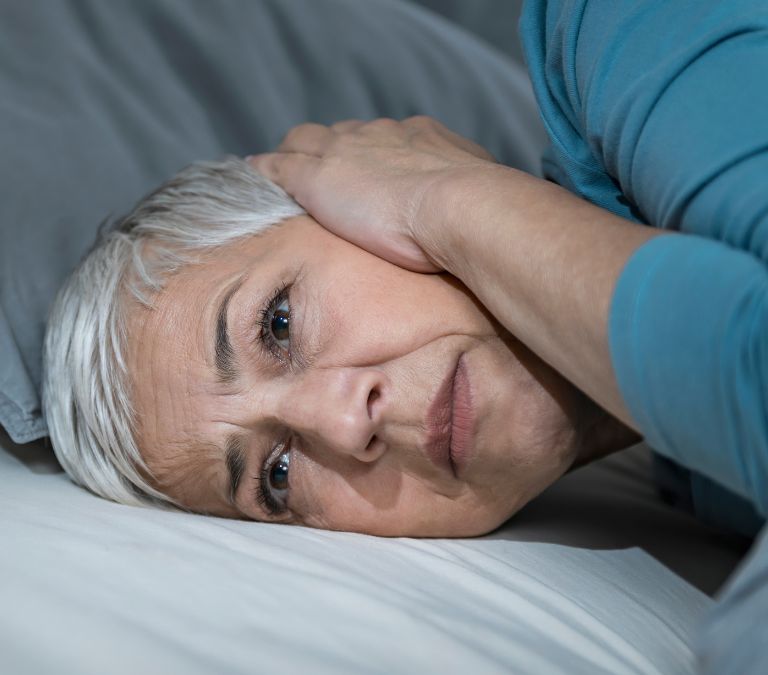Many women have insomnia and other sleep disturbances during perimenopause and, in rare cases, after menopause. Night sweats, breathing problems when sleeping, and mood swings are all symptoms of this condition.
Sleep is considered the most crucial component of health. Hence sleeplessness may have devastating effects. Anxiety, irritability, exhaustion, and cognitive impairment are all symptoms of menopause that can be caused by a lack of sleep or made worse by it.
Many menopausal women wake up right before a hot flash, although it may feel like a hot flash woke them up. Hot flashes are a common symptom of menopause-related insomnia. Extreme heat can strike at any time of the day or night, and it is never pleasant. When nighttime heat flashes strike, sleeplessness is common.
In addition to the sensation of heat, there are changes in the brain that lead to the hot flash itself, and those changes — not just the feeling of heat, may cause the awakening.
Sleep problems, such as sleep apnea, are also common in postmenopausal women, possibly due to the decline in reproductive hormones such as estrogen and progesterone. Because women typically attribute sleep problems (including daytime exhaustion) to menopause, they may go misdiagnosed.
Sleep apnea is twice as common in postmenopausal women than in younger ones. The protective impact of hormones appears to reduce with menopause, but it is rather strong before menopause. The signs of sleep apnea in women are generally less obvious than they are in males. They could be less inclined to get checked out for sleep apnea. Because of this, the assessment and diagnosis of sleep apnea may be delayed even further.
Mood disorders and anxiety are other possible contributors to menopausal insomnia. Stress, anxiety, and mood swings, especially sadness, can all play a role in disrupted sleep. It’s possible that addressing these concerns will also improve your ability to sleep.
When it comes to falling asleep, melatonin is only one of several potential over-the-counter remedies for women. Some people try sleeping pills, which might work temporarily for some people. However, it would be best if you did not take them for an extended period because they are not a permanent solution to sleep problems like insomnia.
Lack of sleep can have far-reaching consequences. Sleep deprivation can make you cranky or sad, forgetful, and even more prone to mishaps like tripping or falling. New evidence reveals that waking up from sleep may trigger hot flashes by waking up from sleep rather than the other way around.
Establishing certain routines before bed to improve your sleep quality is important.
Causes of Sleep Deprivation during Menopause

Sleep deprivation is a common complaint among women going through menopause. Studies have shown that 60% of postmenopausal women suffer from chronic sleeplessness.
- Changes in hormone levels
During menopause, your levels of estrogen and progesterone drop. Several alterations to your routine, including your nighttime routine, may be brought on by this. For one thing, progesterone is a hormone that often causes sleepiness. You may have trouble falling asleep while your body adjusts to lower hormone levels.
- Stress
It’s not only your mental health that might suffer when you combine work, family, and personal connections. That’s not the only way they may disrupt your slumber.
- Medications
Certain drugs and supplements can also disrupt the same natural chemical and hormonal shifts. Many drugs have side effects that make it difficult to fall or stay asleep; starting a new prescription or using an OTC supplement might contribute to your sleeplessness.
- Heat
Two of the most frequent menopausal symptoms are hot flashes and nocturnal sweats. As your hormone levels rise and fall, you may experience what seems like extremes in temperature.
The quick drop in hormone levels is causing an increase in adrenaline. When faced with a stressful or life-or-death situation, this substance is released. As your body tries to recuperate from this rapid influx of energy, you may find it difficult to fall back to sleep.
- Psychiatric conditions
There is a correlation between mental health issues, including anxiety, depression, and sleeplessness. In addition to causing mental distress, several of these conditions can impede one’s ability to get a good night’s rest.
- Air travel
Air travel may disrupt your sleep routine. Adjusting to a new time zone and jet lag can negatively affect your health, both now and in the future.
- Aging
Sleeping disorder is more likely to affect those over 60; thus, becoming older means you’ll have to deal with the consequences of alterations in your sleep pattern that occur naturally over time.
- Adherence to a particular set of dietary practices
Eating too close to bedtime might disrupt digestion and, in turn, sleep quality. Coffee, tea, and wine are all stimulants that might keep you awake at night.
15 Natural ways to deal with sleep deprivation during menopause
Below are the most effective natural treatments for improving sleep hygiene and overcoming menopausal insomnia.
- Modifying your sleep routine might be as effective as taking a pill or using a natural remedy.
- Exposure to early sunshine is an essential part of our evolutionary legacy, so make sure you’re getting enough of it. It aids in the generation of melatonin, our sleep hormone, which helps to synchronize our internal, 24-hour circadian clock and prepare the body for slumber at night.
- Get your coffee before lunch. Caffeine has a half-life of six hours, which is the amount of time it takes for 50% of the drug’s initial effect to wear out. Caffeine consumed around 4 p.m. will still be present in the body at night. Drink your coffee before noon if you want to improve your sleep hygiene.
- Create a relaxing routine that you follow 30-90 minutes before bedtime; this will teach your body and mind to prepare for sleep; This is meant to be a soothing routine. Some self-care activities include taking a long, hot shower, burning an aromatherapy candle, doing deep breathing exercises or meditation, reading a book in the glow of a dim lamp, and keeping a gratitude diary.
- Make sure there is no light in your bedroom at night: When it’s dark outside, our brains know it’s time to start winding down for the night. The hormone melatonin, primarily responsible for causing sleep, is secreted in response to this stimulus.
- Take valerian root. Traditional uses for valerian root include treating insomnia and calming nerves. This herbal treatment has been used for centuries because of its relationship to the neurotransmitter gamma-aminobutyric acid (GABA), which is responsible for reducing anxiety and facilitating sleep. One of the valerian root’s main components, valerenic acid, blocks the breakdown of GABA in the brain, leading to a more relaxed state of mind.
Chronic stress, anxiety, and low sleep quality are all related to insufficient GABA production. If you’re having trouble falling asleep during menopause, try taking a couple of pills of valerian root extract (300 mg) 30 minutes before bed.
- Consume magnesium-rich foods. One of magnesium’s many functions is helping people get a good night’s rest by stimulating their parasympathetic nervous system; This is the system in charge of making you feel peaceful and at ease.
Magnesium, like valerian root, raises levels of gamma-aminobutyric acid (GABA). Magnesium is widely believed to aid in alleviating anxiety, which hampers healthy sleeping habits and is particularly prevalent during the menopausal transition. The results also suggest magnesium deficiency may contribute to sleep problems such as insomnia and restlessness.
If you’re having trouble sleeping during menopause, try to increase your magnesium intake to 375 mg daily.
- L-theanine, included in the Theanine and Lemon Balm Complex, may boost sleep quality by maintaining typical brain activity. This amino acid boosts GABA in addition to the feel-good neurotransmitters serotonin and dopamine. These neurotransmitters in the brain are involved in emotional and mood regulation, which may lead to the sort of calmness that facilitates sleep.
When taken together, L-theanine and lemon balm may help menopausal women feel more at ease and have a better night’s sleep. Try a supplement that combines 200 milligrams of the amino acid theanine with 600 milligrams of the herb lemon balm.
- Juice from sour cherries (Tart cherry) has been linked to an increase in melatonin, which has been shown to have beneficial effects on sleep.
Take 10 milliliters (two tablespoons) daily, preferably before dinner, to aid sleep hygiene throughout menopause.
- Meditation and relaxation are important. It has been suggested that meditating before bed might help you get to sleep. Regular meditation helps calm breathing and lower stress hormone levels.
Focusing on something, such as your breath, a sound, or a word, might help you relax and concentrate during meditation. One of the benefits of meditation is that it raises your level of bodily consciousness, relaxes your body, and quiets your thoughts.
- Yoga is a practice that may help you unwind, deepen your breath, get in shape, and feel better physically and mentally. It was developed from ideas in ancient Indian thought. Some have defined it as the coming together of one’s mental, physical, and spiritual selves.
It has been shown that yoga can help with insomnia, according to a review published in 2017. According to the review, mindfulness-based stress reduction and tai chi were also beneficial. Tai chi is a slow-moving martial art.
- Aromatherapy: An examination of 23 papers published in 2019 found that aromatherapy helps enhance the standard of sleep. Massaging with aromatherapy oils was more effective than just inhaling the oils alone. Traditional English medicine has traditionally included the use of lavender. It’s a great oil for relieving stress and anxiety.
If you’re having trouble sleeping, try tucking a lavender sachet inside your pillow. You might also put one or two drops of lavender essential oil on a napkin and sniff it.
Some people find that a few drops of lavender oil in a warm bath helps them relax. It is possible to cool down by taking a warm bath. You might find sleep aid in this.
There are a few more aromatherapy oils that may aid sleep. That includes but is not limited to Chamomile, Patchouli, and Ylang-ylang.
- Nutrition and Diet: The foods you consume or don’t eat might affect your sleeping patterns. It would help if you consumed caffeine, alcohol, and nicotine in moderation. Both caffeine and nicotine have been shown to significantly alter sleep patterns. Both of these chemicals have the potential to make one sleepless and agitated.
Caffeinated beverages include Coffee, Tea, and Soda. In addition to the usual beverages, you may find caffeine where you least expect it, such as flavored cold and cough medicines. In addition to waking you up at night, alcohol can stimulate your central nervous system.
The amino acid tryptophan occurs naturally in several foods. It functions as a precursor to the neurotransmitter serotonin. Melatonin is produced when serotonin is transformed.
You might find it helpful to consume some carb-heavy snacks like whole-grain crackers before bed. You should also include vitamin B6-fortified foods. Bananas, and wheat germ, are all good sources of this vitamin. The body’s ability to convert tryptophan is aided by vitamin B6. Taking L-tryptophan supplements is not suggested. They are associated with a disorder that causes pain and skin issues called eosinophilia-myalgia syndrome.
- Reduce sugar intake: A sugar rush is possible, although the effects don’t last long. The result might be erratic blood sugar levels. Insomnia can occur if blood sugar drops too low during the night.
Herbs to Help You Sleep Better during Menopause
- Valerian
Valerian is an herbal home remedy. It is taken as a supplement or brewed as a tea. Its uses include: Reducing anxiety and improving sleep quality.
However, some people in the studies anecdotally reported that their sleep quality improved with valerian.
Valerian is known to affect levels of gamma-aminobutyric acid (GABA), a calming chemical in the brain. Valerian relieves muscle spasms.
- Lemon Balm
Lemon balm is a herbal supplement and tea. It is known to calm the nerves and relieve anxiety.
- Ayurveda
Ayurveda is an Indian system of medicine. It is predicated on mind, body, and soul harmony.
In Ayurvedic medicine, an imbalance of Vata is frequently linked to sleeplessness. Vata is one of the energies or life forces according to Ayurveda.
Vata controls respiration and circulation in Ayurveda. Vata imbalances are associated with irritation, anxiety, and dread of falling asleep.
Applying oil to the head and feet is one Ayurvedic remedy; This often consists of heated sesame oil for data imbalance.
- Kava
Kava is occasionally advised for sleeplessness brought on by worry. However, the Food and Drug Administration of the United States has warned customers about the danger of serious liver damage from taking kava supplementation.
- Vitus Agnes Castus
The plant Vitex agnus castus is also known as the “chaste tree.” It could help with sleepiness brought on by menstruation and menopause.
In one research, female subjects received Vitex agnus castus, magnolia extracts, and soy isoflavones, a plant substance that resembles the hormone estrogen in certain ways.
Study participants were followed for one year. The research found this treatment to be safe and effective.
A health issue may be the cause of your chronic sleeplessness. The following are some common health issues that cause sleeplessness:
- Diabetes
- Elevated blood pressure
- Depression and mood disorders
- Aging
Be sure to inform a doctor or specialist if you experience these symptoms. Do not attempt to treat yourself with complementary or alternative medicine.
How to Have a Good Night’s Sleep during the Menopausal Transition and Beyond

Throughout the menopausal transition and beyond, you can try several natural sleep aids. Some have been scientifically demonstrated. Others’ worth is ambiguous or ambivalent.
Here is a summary of the common practices that help improve sleep during menopause:
- Maintain a consistent sleep routine. Set a consistent wake-up and sleep time each day.
- If you can, try to avoid taking naps in the late afternoon or evening. It might cause you to lose sleep.
- Set up a nighttime schedule. Some individuals unwind by reading a book, taking a warm bath, or listening to calming music.
- Avoid using your computer, phone, or television in your bedroom. You can have trouble falling asleep due to the brightness of these devices.
- Maintain a calm environment and a reasonable room temperature in your bedroom.
- Exercise regularly throughout the day, but not right before bed. Poor sleep can be a result of inactivity. Body stress and muscle strain increase. That night, exercise can encourage restful sleep. However, avoid exercising too close to bedtime since this might raise adrenaline levels, which can cause insomnia.
- Avoid eating a lot right before bed.
- Late in the day, avoid caffeine (which is present in many coffees, teas, and chocolates).
- Don’t forget that drinking won’t make you sleepy. It is challenging to stay asleep even in little doses.
- It has been demonstrated that music therapy enhances sleep quality. Additionally, it may prolong the time spent sleeping and improve sleep quality. Slow, soothing music may also enhance sleep.
- Try a Chillow, a thin, flat foam cushion insert, if you get hot flashes. It helps to keep your head cool at night.
- Water: Drinking a little water before bed is helpful if you’re dehydrated. A shot glass of warm water should be plenty in most cases. That can assist with the previously stated irritated bladder issue and keep you hydrated during the night, especially if you experience night sweats. That’s because dehydration causes your pee to become extremely concentrated and acidic, irritating your bladder and causing you to become awake. Therefore, a small glass of water before night is typically enough to prevent that specific issue.
- Light Exposure: Sometimes, doctors recommend using light therapy as a treatment strategy for insomnia. The body uses light to determine when it should sleep and awaken. Try going for a stroll outside first thing in the morning if you have difficulties sleeping at night.
A home light therapy gadget might be helpful. Inquire about these gadgets with your doctor or a sleep expert. Extra light in the late afternoon may be necessary if you get up too early or sleep too early. While it’s still bright out, go for a stroll in the afternoon. Two or three hours of light treatment before bedtime is another option.
What Should You Do to Cure Frequent Night Hot Flashes?

You can adjust your sleeping environment to make yourself more comfortable if your hot flashes become more frequent at night. Consider installing an air conditioner in your bedroom or positioning a big fan next to your bed if you struggle with night sweats and hot flashes. Cooling down the bedroom can at least make you more comfortable, even if it doesn’t stop your hot flashes.
It’s crucial to discuss any changes in your menopausal symptoms with your doctor. For your doctor to create an efficient treatment plan that will keep you comfortable while your body changes, it is important that you keep them informed about all of your menopausal symptoms, including night sweats and hot flashes.
Can HRT Help Cure Sleeplessness during Menopause?
Yes. Many studies have indicated that HRT improves sleep in vasomotor-symptomatic women. HRT’s estrogen component treats estrogen insufficiency symptoms. Progesterone may help sleep disturbances by increasing non-REM3 sleep. Progesterone or progestogen is indicated to be taken alongside estrogen to avoid estrogenic activation of the womb lining. When sleep disruption is a prevalent menopausal symptom, progesterone may be used to preserve the uterine lining instead of progestogen, which does not improve sleep.
Low-dose antidepressants, Gabapentin, and Clonidine may also assist. HRT is the first-line treatment for menopausal symptoms. However, You can use these additional drugs instead.
Conclusion
For some people, melatonin, exposure to light, and relaxing techniques like yoga and meditation seem helpful. Acupressure may also be beneficial. Hypnosis, acupuncture, and aromatherapy have little support.
Avoiding substances like coffee, alcohol, and sweets before bed may help you sleep better. You could also find that certain meals aid in sleep.
For centuries, people have used herbal teas and pills to alleviate insomnia. Therefore, you might want to try some herbal methods to see which works best for you.







